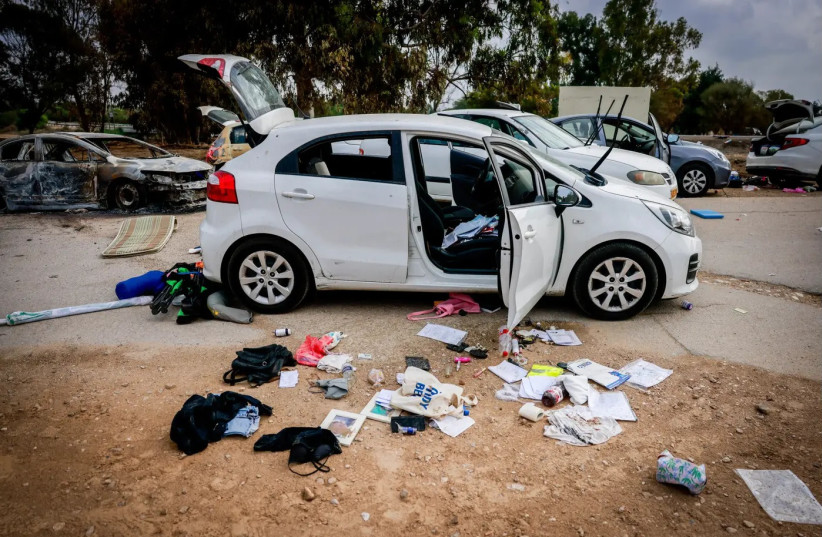The horrific events of October 7 have redefined a generation of Jewish youth, both in Israel itself and in North America, in ways we are only beginning to understand. While over 1,200 people were mercilessly killed on that day, it was the Re’im “Supernova” music festival, where well over 360 young people were slaughtered, and from which more than three dozen more were taken hostage, that has become a key symbol of that terrible day. Half a world away, Jewish college students have borne much of the brunt of the huge wave of antisemitism and anti-Zionism that has inundated our campuses, and made many Jewish students tremble for their safety.
In early November, we translated the feeling of despair into action when we boarded a plane to participate in the Jewish Federations of North America’s Solidarity Mission to Israel. As two members of the Jewish Federations’ Changemakers Program, which empowers emerging leaders of the Jewish community in their early to mid-twenties, we were eager for the opportunity to see firsthand the impact of the war on our peers in Israel. We saw how the over $700 million already raised by the Jewish Federations of North America and its partners are being spent to relieve the terrible suffering in Israel.
While our peers on college campuses tried to hide the truth about Hamas’s true intentions or suggest that Jewish suffering is irrelevant in the face of “liberation,” we traveled to Israel to bear witness to the aftermath of the attack and to comfort our brothers and sisters with the promise that they are not alone in their suffering, and that their stories will be told.
Traveling to Israel and bearing witness to the horrors of Hamas's terror
On our brief 36-hour trip, we met with survivors of the terror attack from two communities in Israel, Kibbutz Be’eri and Ofakim, who recounted the horrific events of the massacre. We also spoke with the families of some of the hostages, including the family of Tamar Gutman, a 27-year-old civilian kidnapped by Hamas.
According to her family, Tamar was a fighter and full of ambitious dreams. She had just begun her second year of law school, had been making strides in fighting the medical complications associated with Crohn’s Disease. Along with thousands of other partygoers her age, Tamar had enjoyed a long carefree night of dancing and partying until the sun rose on October 7 and the horrible nightmare began.

Tamar was among those dragged away by Hamas terrorists and taken into captivity in Gaza, leaving her family in unimaginable terror and distress for weeks on end. As we packed our bags at the conclusion of our trip the next day, we received the devastating report that Tamar had been identified by the IDF in videos from within Gaza and declared dead. Tamar’s irreplaceable light had been extinguished at the hands of terror.
Just a couple of weeks after our return from Israel, we were gratified to see so many tens of thousands of Jewish people our age participate in the huge March for Israel in Washington. Some talked about their own brothers and sisters who had been taken hostage; others announced what they are doing on campus to stand up for Israel and to combat antisemitism.
One of the most haunting moments of the march came when Rachel Goldberg, the mother of Hirsch Goldberg-Polin, the 23-year-old American-Israeli man who was kidnapped after having his arm blown off by Hamas, made her plea.
Speaking for the hostage families, who have been living for weeks with “slow-motion torment,” she said, “We all have third-degree burns on our souls.” She asked pointedly, “Why is the world accepting that 240 human beings from almost 30 countries have been stolen and buried alive?” Another was when Noa Fay, a senior at Columbia University who is black, Native-American, and Jewish, told the crowd that on her campus, more than 100 professors have defended Hamas and echoed its calls for Israel’s destruction. “I will not be silenced,” she cried.
Nor will we. Our generation, which is often perceived in broad-brush strokes as not sufficiently engaged in Jewish community or connected to Israel, is at the forefront of communicating a positive, resilient, and proud Jewish identity, one that has Israel and the entire Jewish people at its center. We hope that we will soon be joined as changemakers by many of our peers so that they can have the same transformational experience that we have had in developing our leadership skills, building our networks, and developing new ways to make a real difference in Jewish life at this time of turmoil.
Changemakers has engaged 2,500 young people since 2020, and plans to engage another 1,000 over the course of this year. This is a perfect opportunity to find aspiring Jewish leaders and give them pathways to get involved in the Jewish community.
The Talmudic sage Resh Lakish said in the name of Rabbi Yehudah Nesiyah, “The world is saved by the breath of the schoolchildren.” (Shabbat 119b). The war in Israel has highlighted the importance for our generation to bear witness, to get involved, and to speak out. Young Jewish people were targeted for murder and abduction by Hamas, and our generation must be at the forefront of the long campaign ahead for Jewish pride, for justice, and for peace.
As Fay put it in her remarks, “Until October 7, my classmates and I had forgotten not only why we love Israel, but why we need Israel.”
We will not forget again.
The writers are members of the Jewish Federations of North America’s Changemakers program.
